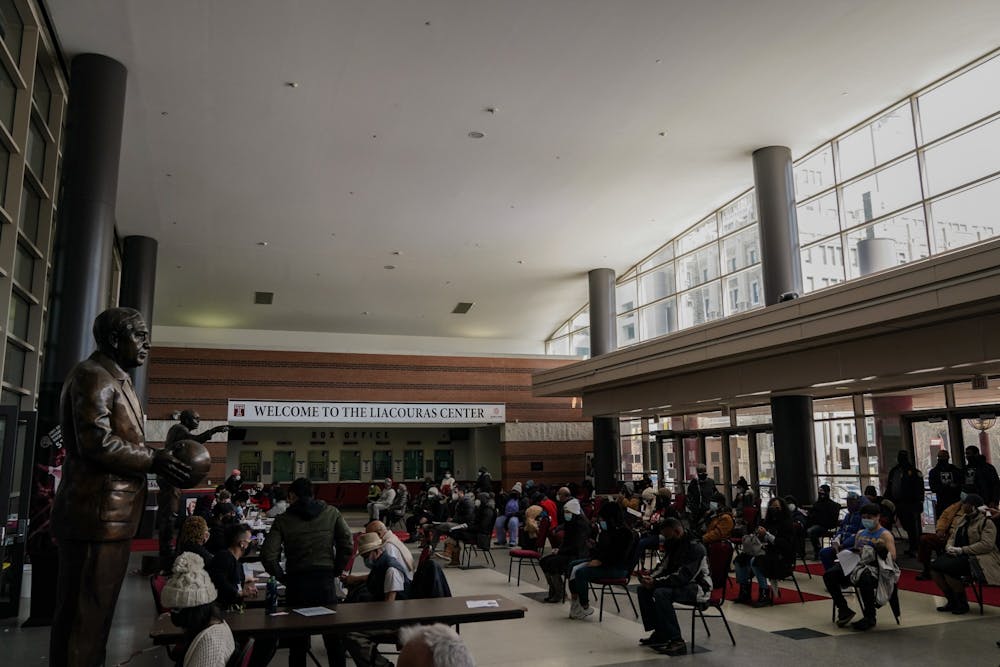
Patients await to be vaccinated at the Black Doctor's Consortium on Feb. 20.
Credit: Chase SuttonSeveral Penn students were among the more than 25,000 Philadelphians vaccinated through the Black Doctors COVID-19 Consortium over the last month.
The Consortium offers free COVID-19 vaccines to Philadelphians who are eligible under Phase 1B of vaccine distribution and live in the hardest-hit zip codes. Penn's zip code 19104 was previously included in the list but has since been removed, as the list of zip codes is subject to change. The students who received the vaccine through the Consortium said they felt fortunate to get vaccinated, despite long lines at the various clinics.
Philadelphia's Phase 1B includes essential workers who are at high risk for exposure and persons with high-risk conditions, according to the Consortium website.
The Consortium aims to reduce the number of cases and deaths from COVID-19 among Black Philadelphians. As of Feb. 21, 18.6% of all vaccine doses in Philadelphia went to Black recipients, despite the city having a population that is more than 40% Black.
With the Consortium, however, 82% of vaccines went to people of color, and 75% went to Black people, Consortium founder Ala Stanford told 6ABC News.
Wharton and Engineering sophomore Cole Fairchild, who qualified for the vaccine under Phase 1B, signed up for the vaccine through the Consortium in January and was instructed to show up for his shot on Feb. 12 at the Deliverance Evangelistic Church in North Philadelphia. Although Fairchild described a five-hour wait in 25-degree weather, he said it was an overall positive experience because he was able to receive the vaccine.
College first year Nuwar Osman, who is eligible under phase 1B, received her vaccine at the Consortium's 24-hour mass vaccination clinic on Feb. 19. Despite pre-registering, she accidentally ended up in the walk-in line and waited eight hours before eventually receiving the vaccine. At the Feb. 19 clinic, there were separate lines for different groups, including pre-registered patients and non-English speaking patients.
“I think that a lot of the people in line were constantly thinking about if they run out of vaccines, because there were definitely more than 3,000 people in line [for the vaccine]," Osman said. "[Employees] kept coming around like counting and making sure that if you waited in line that you would get it.”
College junior Kendall Roseboro, who is studying health and societies and plans to sub-matriculate into Penn’s Master's in Public Health program, has worked for the Consortium since August, filling out patient vaccination cards, explaining her own experience receiving the vaccine, and providing information about the vaccine’s Food and Drug Administration’s approval to patients.
Roseboro said Penn students should remain mindful of their privilege and circumstances when opting to receive the COVID-19 vaccine. For students who may have access elsewhere, she suggested they consider prioritizing the Philadelphia community who may be more disadvantaged.
She said she attributes the Consortium's success to Stanford, its founder, who helped ease vaccine hesitancy among communities of color when she received the vaccine in December.
Roseboro said that Philly Fighting COVID's mishandling of vaccine distribution prompted increased concerns about vaccine uptake. In January, the city ended its partnership with the organization after they presented themselves as a nonprofit and did not disclose that residents' personal information could be sold.
She said that the city's actions reflected “the peak of white privilege” because Philly Fighting COVID had secured funding and vaccines, with little proof of competence, commitment to the local community, or oversight. The Consortium, however, is led by a pediatric surgeon and received limited support from the city.
College first year Nia Peterson also volunteers with the Consortium, helping with data entry and clerical work, and staffed the Feb. 12 clinic from 7 p.m. to 7 a.m.
"The people who volunteer are just amazing," Peterson said. "It’s kind of crazy to see what they can do and how much energy they have."
The Black Doctors COVID-19 Consortium will now be offering the one-shot Johnson & Johnson vaccine, in addition to Moderna's. Second shots will be administered on March 22 and the 23, a little more than three weeks after the mass clinic on Feb. 19.
The Daily Pennsylvanian is an independent, student-run newspaper. Please consider making a donation to support the coverage that shapes the University. Your generosity ensures a future of strong journalism at Penn.
Donate



